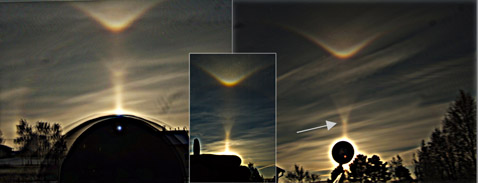In the image on the left is Moilanen arc among other halos. On the right is similar looking halo (arrow), but its V is more pointed and it is also closer to the sun, about 7 degrees above it. These are stacked images, the inset image is a single frame showing the same arc (and also a weak Moilanen arc above it).
This halo seems to be what could be called a "reflected lower sunvex Parry arc". It was Walt Tape who suggested this kind of explanation for the arc. I will later add a post with simulations, crystal figures and raypaths. Pictures of the halo were published today in Tähdet ja avaruus magazine in Finland.
*** addition 5 December: see the upcoming posting on Les Cowley's site ( 1 ), which lights up the formation of this arc ***

Wow.
ReplyDeleteso, on left photo it is posible to see 2 "V"-shaped arc, one big - M-arc and the second (down and less visible) - "reflected lower sunvex Parry arc"
"reflected lower sunvex Parry arc" - this is a new type of halo? or it will theoreticaly predicted before?
What Marko Riikonen is (hence being _radically modest_) leaving out here, is that he has discovered a new halo in nature and now telling about it.
ReplyDeleteThe ice crystal origin was solved by Riikonen and others in co-operation with Walt Tape. Tape´s intuition led to the right conclusions.
This is the first really good case of a complete new halo found from Europe´s skies around the sun in a very long time.
In 1995 Jarmo Moilanen found the Moilanen arc (also known short as "M arc") in Oulunsalo, Finland. he was first to describe it in the literature (publication in british Weather-magazine).
I guess its not a coincidence, that the Lascar display was handled in the previous postings. That was Riikonen´s first ever display with this kind of bomb news regarding solar halos. (That was outside of Europe, namely in Chile.)
Congratulations to Marko!
Congratulations Marko! I know what sort of dedication there is behind this discovery - well deserved!
ReplyDeleteThe days of discovery seem far from being over.
Well spotted!
ReplyDeleteRight, Vladimir. The new halo arc is also weakly in the photo on the left. I thought it is so cryptic, that did not bother to mention about it.
ReplyDeleteThink about all the Parry arcs that can be seen at certain sun elevation and then turn the sky upside down and you have the reflected Parry arcs. So it is like parhelia - subparhelia relationship.
Marko P. I did not consider this posting modest. You should have seen my first version.
Vladimir, the strong, large V is the new halo. The Moilanen arc is the very faint small arc above and within the new halo.
ReplyDeleteWhen Marko R says it was so "cryptic", he is being ironic. The new V-shaped halo is gorciously bright and clear in the photos as you can all see, it dominates the view directly above the sun.
At first hand one assumes it is a hansom and unusually bright Moilanen arc, but when you look closer, you notice it is too low and that the (faint) Moilanen arc is above it - very dimly visible as well.
Okay, to correct my last comment, Vladimir is talking about the comparison image on the left side.
ReplyDeleteYou are right, that image has strong Moilanen as Marko R says. I was talking of the images on the right side. Sorry of the confusion.
It would help a lot to have a row of labeled images with texts and arrows "Moilanen arc" / "New halo".
Yes, it would have helped, there is truly a potential for confusion in my posting.
ReplyDeleteLes should be putting up a post on this on sunday night / monday, where everything should be clearly explained.
I marvel the intensity of the new halo. Given the peculiar crystals and the ray path needed, it's a little miracle that it's so intensive.
ReplyDeleteGorgeous, absolutely gorgeous. I get goosebumps just thinking about it.
Wow a totally new halo?! Good work Marko you are the man. The new arc could not be a reflected convex parry because the convex parry in the UTS is weak the new unknown arc is sharp and well defined. There must be some twinning of ice crystals making this arc. Did you get samples during the display when the arc was pesent? crystal sample may help solve the mystery behind the new halo. Again congrads on the new arc.
ReplyDeleteNo samples, Michael. Good point about the diffuse looks of the upper sunvex Parry vs. the new halo. It has bothered me as well.
ReplyDeleteActually I have also wondered why upper sunvex Parry is almost always so diffuse in diamond dust, but still one gets helic arc that requires pretty steady crystals.
Clearly there is something going on that we don't understand. Gotta see what is the crystal tilts envelope for the new halo.
Marko, hats off!!! Jari's right: the discovery is well deserved.
ReplyDeleteCongratulations Marko!
ReplyDeleteI've dreamt of finding a new halo since I was 11 (roughly at the time of discovery of Moilanen arc). Now I realize I first have to advance to a level of everyday spotting of heliac arcs etc. (still waiting for my first) like Marko has. ;)
Well, thanks folks. And thanks for Les allowing a pre-publication of his page.
ReplyDelete